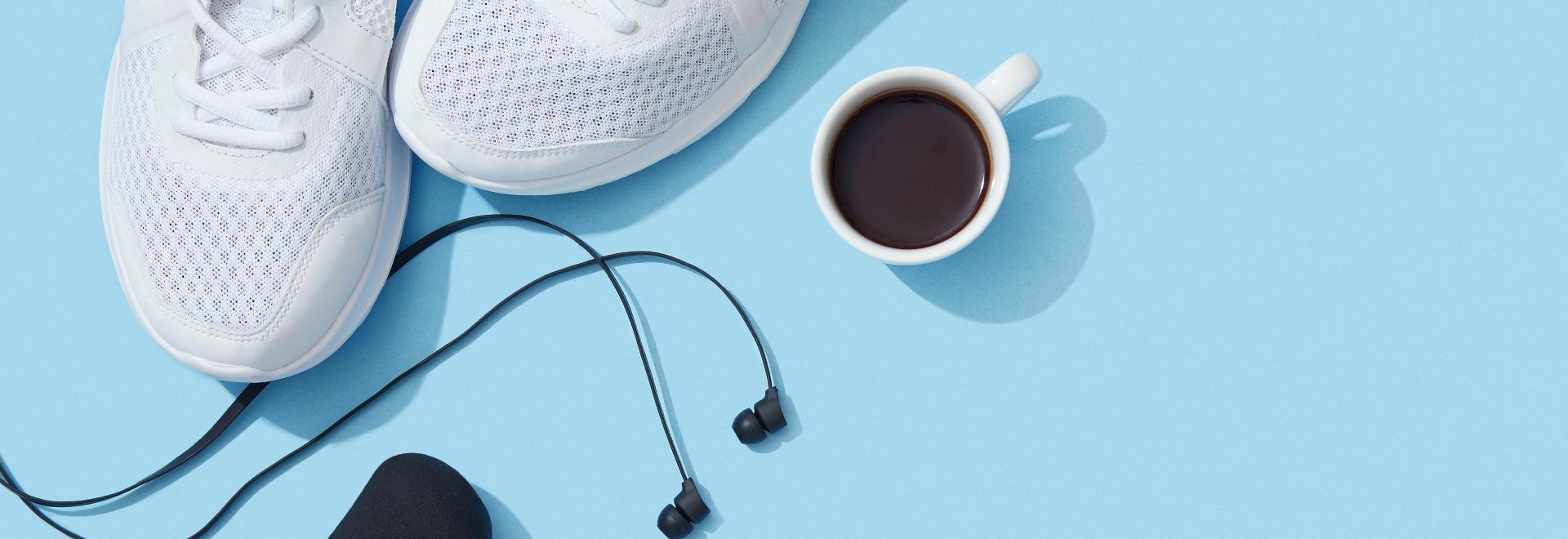Is “pre-workout coffee” a scam?
João Carvalho speaks with professional nutritionist Carolina Baliere to find out whether a cup of coffee can act as an effective pre-workout supplement.
In 2004, the World Anti-Doping Agency removed caffeine from its list of banned substances opening the door to a plethora of pre-workout mixes containing the stimulant, from protein shakes to ready to drink coffees.
Recently, scientific research has shown that caffeine has positive effects on a wide range of aerobic and anaerobic sport-specific actions, including muscular endurance, movement velocity, and muscular strength. Actions like sprinting, jumping, and throwing have all been shown to benefit from caffeine consumption.
Another systematic review of multiple studies found that caffeine can help increase an athlete’s performance even if consumed in moderate doses.
Caffeine reaches its metabolic peak about two to three hours after ingestion and remains in the body for about four hours after consumption. However, this can vary depending on several factors, such as the dose ingested and personal characteristics like weight, age, and sensitivity to caffeine and other stimulants.
It’s no surprise, then, that coffee drinkers leverage caffeine to get the best out of their training sessions. At the most basic level, athletes can simply brew their own coffee at home.
According to data from Kerry Group, consumers are more likely to experience innovative offerings in beverages than in food, making the caffeinated beverage category a channel with high growth opportunities.
With this sort of potential, major brands are taking full advantage. Both Nestlé and Starbucks already have functional coffee products, while Brazil’s 3 Corações recently launched the sub-brand Ultracoffee, which unites the company’s flagship cappuccino formula with vitamins and other micronutrients.
What does caffeine do to the human body?
Carolina Baliere, a Brazilian nutritionist with a master’s degree in clinical and athletic nutrition, says that caffeine is helpful for those who seek a more significant energy supply before working out.
“It is absorbed quickly by the gastrointestinal tract and soon reaches a peak concentration in the blood,” she explains.
Once it enters the bloodstream, caffeine acts as a stimulant, meaning it increases the body’s central nervous system’s activity level. Other well-known stimulants include nicotine and methamphetamine.
In the brain, some of the caffeine attaches to adenosine receptors, lowering this compound’s activity. Adenosine is one of the building blocks of human RNA and plays a role in sleep regulation. As such, when it’s blocked by caffeine, the brain becomes more alert and performs better.
Increased nervous system activity also speeds up the metabolism and increases overall body performance, among other benefits. Carolina reinforces that drinking coffee is considered an outstanding stamina booster and improves the levels of both concentration and performance during physical activities.
Additionally, she says, caffeine has positive effects that last long after the workout is complete.
“During pre-workout, caffeine makes you more willing to do intense workouts, increasing caloric expenditure,” she elaborates. “During post-workout, the chemical compound helps with the buildup of lean mass because it plays an important role in sugar delivery into the muscles, as well as in tissue recovery.”
Furthermore, coffee itself is also rich in antioxidants. Some of these have the potential to reduce inflammation in the body, optimising muscle recovery time and reducing soreness after training.
How can athletes tap into the benefits of caffeine?
As with any other supplement, there are several recommended guidelines that can optimise the effectiveness of caffeine. For example, since caffeine is a fast-absorbing substance, it should be consumed around 30 minutes before training.
Furthermore, the way the coffee is prepared can also have an impact. Carolina recommends avoiding sweetening the drink with sugar, as this may cause blood sugar spikes that can hinder some of the beneficial effects.
Carolina also points out that some coffee drinks are becoming specifically associated with health benefits. For example, more and more people are drinking “bulletproof coffee”, which is black coffee mixed with some coconut oil.
“Bulletproof coffee is excellent for enhancing stamina and performance while working as a fat-burning ally,” she says.
However, she warns that each person should consider their own needs before committing to this trend.
“It’s good for those who prefer to work out on a fasting basis, as long as they are already well adapted to this habit.”
Another trend involves adding cinnamon to coffee. Carolina explains that its thermogenic properties promote complex and slower digestion that favours calorie burning. It also promotes glucose absorption and reduces resistance to insulin, promoting ketosis – a metabolic state that can fight type-2 diabetes.
In the last five years, the retail coffee market in Brazil has had a proliferation of products labelled as “super coffees”. These are coffee-based powdered compounds intended to be consumed with water, juice, or milk, and are formulated to optimise athletic and cognitive performance.
Products categorised as super coffees may promote nutritional and metabolic benefits, and their popularity is on the rise. In fact, functional coffee is expected to experience a compound annual growth rate (CAGR) of 6% from 2022 to 2027.
Businesses like gyms can leverage this potential by opening coffee bars equipped with superautomatic espresso machines. A machine like the Carimali SilverAce Plus can brew both coffee beans and powdered products. With this feature, it could be used to brew up to 200 cups of “super coffee” a day.
Ultimately, however, athletes choose to consume their pre-workout coffee, they’ll undoubtedly experience its potential as a mind and body stimulant.








